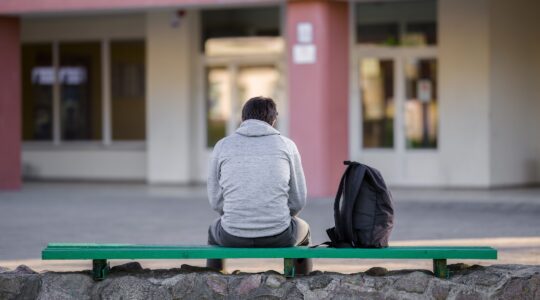Once a week, Isaac Santelli makes his way to a public school on Chicago’s South Side, where he volunteers teaching high school students about some of the most freighted words imaginable for young people today: sexuality, consent and communication.
“If kids can sense that you are uncomfortable talking about this, they’re already uncomfortable,” said Santelli, a junior at the University of Chicago. Luckily for his students, conversations about gender and consent are natural for Santelli, thanks to a program called Shevet that he participated in as a teenager.
“It was a massive part of my personal and emotional development,” said Santelli of the program, which took place at B’nai Jeshurun, his family’s synagogue on the Upper West Side. Run by Moving Traditions, a Philadelphia-based organization that creates Jewish educational material for teenagers, the program brings together teen boys once a month to learn about and discuss issues related to sexuality, consent and masculinity. “I think a lot of the lessons, the communication skills, my capacity to be honest and emotionally vulnerable [developed in the program] has helped me a lot in the classroom,” he said.
As the #MeToo movement has encouraged women from across the country to come forward with stories of sexual harassment and assault, Jewish organizations are trying to help men and boys have conversations about these sensitive topics with a grounding in Jewish sources.
The Shevet program, which was launched seven years ago and now includes 125 cohorts across the country, is run by local leaders at Jewish Community Centers and synagogues. The groups meet once a month starting in eighth grade and continuing throughout high school.
David Lieberman, who runs the program at B’nai Jeshurun, says it takes time to build the trust needed to have serious conversations about sexuality and masculinity. “We start slowly just getting them to share with stories about themselves and about each other and being able to identify emotions within themselves,” he told The Jewish Week.
Zach Cohn, 15, a sophomore at the Ethical Culture Fieldston School in the Bronx, has participated in Lieberman’s Shevet cohort at B’nai Jeshurun since middle school. The group’s members have discussed thorny questions such as whether they were surprised by the allegations that have come out of the #MeToo movement and how to separate between an artist’s work and behavior.
Cohn said he hasn’t been surprised by the #MeToo movement because of what he’s seen of his own friends’ experiences. “Catcalling, walking with my [female] friends and them not wanting to walk alone — small things like that, I’m aware of.”
Cohn said sessions in which the group role-played hypothetical situations at parties involving alcohol and conversations about consent were especially useful in the group’s all-male setting. Of course, the fun activities, like baking together and playing games, don’t hurt. “Being able to talk to someone, have a mentor, someone you can look up to where the power is not really offset is really helpful,” said Cohn of Lieberman. “He’s someone I can think of as a mentor and as a friend.”
According to Rabbi Daniel Brenner, chief of education and program at Moving Traditions, “When #MeToo started to come out, I think a lot of people were saying OK, now let’s talk about sexual consent.” But, he added, the conversation has to start before consent and Moving Traditions was already ahead of the curve, having started Rosh Hodesh, a program for teen girls in 2002, followed by its program for teen boys, Shevet, in 2011.
“When we shame people, they can’t be vulnerable and learn,” said Deborah Meyer, CEO of Moving Traditions. “When we tell them I see you, I see you struggling, let’s talk about this and figure it out, then they’re going to have the space to talk honestly about what’s confusing them.”
The Shevet program is not the only Jewish program rethinking the way boys are taught about gender and sexuality. The Foundation for Jewish Camps started the Shmira Initiative, providing in-person training for camp leaders earlier this year to improve the culture around gender and sexuality at Jewish summer camps. The group held its first three regional training sessions for summer camp leadership in May and is planning to offer more training sessions next year.
“If camp can impart values in that ideal community, they will take that with them outside of camp, and they will take with them that culture of kindness, of respect, of safety, meaning, responsibility,” said Jeremy Fingerman, CEO of the Foundation for Jewish Camps. “You’ve got to start with the culture.”
High schools are implementing changes as well. At the Charles E. Smith High School for boys in Jerusalem, an Orthodox high school connected to the Shalom Hartman Institute, Dr. Yaron Schwartz, the school’s gender studies coordinator, has created a comprehensive gender curriculum for boys in seventh through 12th grade. The curriculum, which began in 2013, covers subjects like personal and spiritual identity, violence, expressing emotions, homophobia and homosexuality, feminism, consent and relationships. The topics are covered in small groups that meet once a week for a total of approximately 1,000 hours per year, giving the subject equal time to core classes in the high school curriculum.
“The role model that they have from the media, politics, society is different; the role model that they got all the time was of gender inequality and of adopting bad sexual behaviors,” said Schwartz, who also serves on the Shalom Hartman Institute’s Created Equal team researching gender and ethical leadership.
The duration of the program, which spans six years, allows teachers to cover a range of topics at the appropriate age levels, according to Schwartz. “We can really create this different gender climate when kids get the same message all the time. Because we have six years, it can really happen.”
In Orthodox high schools, teaching a standard health class can be a subject of controversy for communities where premarital sex is strongly discouraged. At the Modern Orthodox SAR High School in Riverdale, a health class has been required for all sophomores for years. What differentiated SAR’s program from other schools’ was the beit midrash program portion of the class in which students studied Jewish texts on topics like women’s obligation in religious ritual.
“There’s an approach that says that because halacha [Jewish law] doesn’t sanction any of these behaviors, let’s not talk about it,” said Rivka Schwartz, SAR’s associate principal. “We have to teach our students what we want them to know and not assume that everybody knows or everybody understands everything.”
Since teachers in the school’s internal research institute, Machon Siach, began studying gender and teenagers’ understanding of gender and sexuality, the school began implementing changes in some of its programming outside of health class. In the school’s 12th-grade course on Jewish identity, students had discussed gender through examining the role of women in religious spaces, a controversial topic in the Modern Orthodox community, which has been divided over the issue for years.
Now the course includes more discussion of masculinity and gender dynamics in family life. “We didn’t actually teach specifically about masculinity, about what does it mean to be a good Jewish man,” said Schwartz. “It was pretty obvious that this was a place where work needed to be done and thinking needed to happen.”
Said Isaac Santelli: “You cannot conceptualize or discuss masculinity without also considering the fact that masculinity is one side of a coin, and there is a flip side to it.”
The New York Jewish Week brings you the stories behind the headlines, keeping you connected to Jewish life in New York. Help sustain the reporting you trust by donating today.




